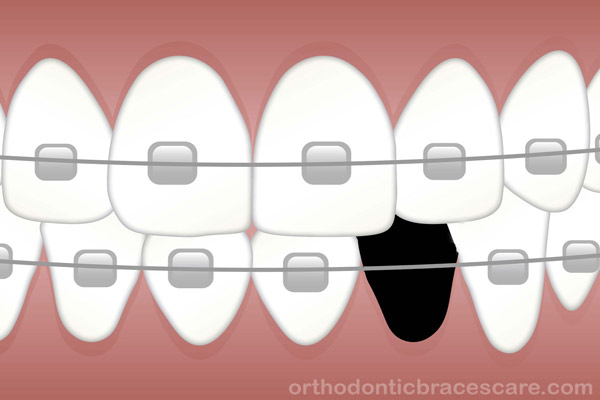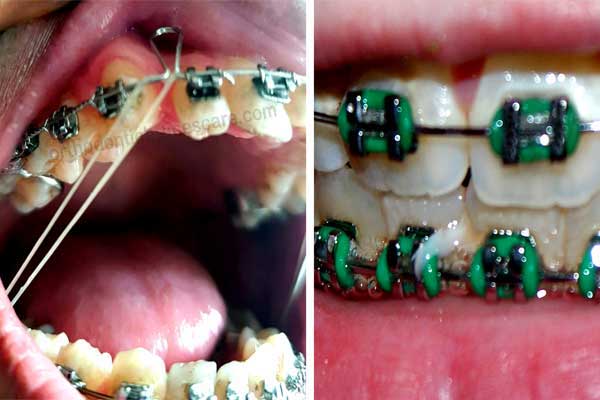Last updated on August 20th, 2022 at 11:16 am
Braces treatment involves some painful experiences and when you get any new component of braces such as a molar band or orthodontic band, you may get worried, “Does molar bands hurt?”
You may experience some discomfort when the molar bands are first placed, but this is usually short-lived. Molar bands are used to help secure dental braces or other orthodontic appliances to the teeth. They are made of metal and are placed around the back molars. The bands are held in place with a very strong bonding agent, and they can sometimes cause discomfort or soreness in the gums.
In this article, you will know when molar bands hurt and how to get rid of the pain.
Does getting molar bands hurt?
You feel a little or no pain when you get molar bands. You might feel a little discomfort or some pressure during the first few days of getting them. This is because your mouth needs time to get used to that foreign material.
Many people get before getting those metal bands.
But, you don’t need to panic because your orthodontist will place the molar bands without hurting you.
He will clean those teeth where he will place the bands. Then, you will put some adhesive glues on your teeth and place the molar bands on the teeth.
This simple procedure isn’t painful at all. Adhesive glue or cement also doesn’t cause any pain.
However, after you return home, you might feel discomfort with those teeth at night as these metal bands aren’t familiar with your oral environment.
But, your mouth gets used to it very soon.
When do molar bands hurt?
You may have to wear molar bands for a very long time. So, you may wonder when your molar band might hurt you.
Usually, you should not feel any pain from molar bands when you get them on, in between treatment, and even during removal. However, after they are placed on your molars, you may experience mild soreness around your teeth and gums. This discomfort is temporary and will last for a few hours.
Though the molar band itself doesn’t hurt your teeth, your teeth may feel pain before getting it because you have to have separators in between your teeth.
Separators or spacers are necessary to create space for the molar band in between your teeth. Without wearing them, the bands can’t be placed on your teeth.
When your orthodontist places those separators, they put pressure on teeth to move them.
So, you will feel pain for a few days in those teeth and gums.
Why do molar bands hurt?
Here are the reasons for which molar bands for braces hurt your gums, teeth, and tongue:
1. Mild pressure from molar bands
A molar band doesn’t put a lot of pressure like braces wires and brackets. However, you may feel pinching or mild pressure because it encircles your teeth. Mostly, this reason is it’s being foreign material to your mouth and teeth. Your teeth and mouth need some time to get used to it.
However, many people don’t feel any pain from the orthodontic band.
Also, check out the causes of one tooth pain from braces.
2. Loose molar bands
If your molar band gets loose, it may dig into your gums and cause soreness. Moreover, an unstable orthodontic band can rub and cut your cheek.
3. Broken molar bands
If your orthodontic band gets damaged due to any injury or any other cause, it may hurt your mouth.
In this situation, other components such as wire and bracket may also hurt your cheek.
Check out my other article on molar band fell off.
4. Braces tightening
The orthodontic band usually doesn’t cause pain, but after the braces tightening appointment, you may feel temporary soreness.
However, most of the pain is from those brackets that put pressure on your teeth.
The reason is your orthodontic puts force on teeth that need to move and the molar band gives support to the brackets and wires.
As molar bands don’t put pressure or move the teeth that they encircle, they don’t cause soreness usually.
5. Improperly placed a molar band
If the molar band is not placed properly, it can cause different problems such as pain, gum swelling, and infection.
6. Bite issue
If you have a bad bite, it means your teeth don’t come together properly. When you talk or chew, your upper and lower jaw don’t work in harmony. As a result, you may feel pain in your temporomandibular joint or TMJ.
Molar bands for braces can also cause a bite issue. If the band isn’t placed properly, it can alter your bite. In this case, you may feel pain in your TMJ and other teeth as well.
7. Gum swelling
When you have gum swelling, a molar band can cause irritation. Maintaining oral hygiene is hard with braces. Moreover, when you have orthodontic bands, food debris or plaque may easily deposit around the band and lead to gingival inflammation.
As gums grow over teeth, they get hurt from the band. In this case, the band isn’t directly responsible for your pain.
8. Allergic reaction
If you have an allergy to a metal, you may experience redness, swelling, and irritation around those teeth where the molar band is placed.
Moreover, you may also have a runny nose, itchy eyes, and rash around your mouth.
9. Infection
If you develop an infection around your molar band, it may hurt a lot. The reason is when bacteria enter the open wound, it causes severe pain. Moreover, pus starts developing around the band which leads to more discomfort and soreness.
If you think you have an infection, you should see your orthodontist as soon as possible.
10. Pressure applied by separators
As you get spacers before molar bands, this is the time when you feel pain and discomfort more than the molar band itself.
Spacers put pressure on your teeth to open up the space. Your teeth and gum feel the pressure and result in pain and discomfort.
Check out my other article and know more about pain from spacers.
11. Teeth grinding
Teeth grinding is a condition in which you grind or clench your teeth unconsciously. This habit can damage your braces and cause pain in your TMJ. Moreover, it can also loosen the molar band that leading to more discomfort.
12. Cheek biting
Molar bands for braces can also cause pain if you bite your cheek accidentally. When the band rubs against your cheek, it may injure the soft tissue and result in pain.
13. Poor oral hygiene
If you don’t take proper care of your teeth and gums, it may lead to different problems such as gum disease, tooth decay, and bad breath. All these conditions can also cause pain around your molar band.
14. Mouth sores
Mouth sores are common when you have braces. However, if you have a molar band, the probability of developing mouth sores increases.
The reason is when food debris or plaque gets deposited around the band, it can cause irritation and lead to mouth sores.
15. Eating hard food
You should avoid eating hard food when you have braces. However, if you have a molar band, you should be extra careful.
The reason is when you eat hard food, there is a chance that the band may get dislodged. Moreover, it can also damage your braces.
16. Lip and tongue irritation
Molar bands for braces can also cause lip and tongue irritation. When the band rubs against your lips or tongue, it may injure the soft tissue and result in pain.
17. Wire poking out
If the wire from your braces pokes out, it can irritate your gums and cheeks. Moreover, it can also cause pain in your teeth.
How long do molar bands hurt?
If you feel pain after getting your molar band, don’t worry as it’s quite normal. This soreness is only temporary and will disappear over time because it takes time for your teeth and mouth to get used to the new bands. For most people, the soreness only lasts for a few hours to a day.
Discomfort from the molar band doesn’t last very long as from brackets after tightening.
However, if you still feel pain after a couple of days, you should visit your orthodontist.
There might be some other reason for your discomfort. Moreover, if your molar band gets loose or broken, you need to see the orthodontist as soon as possible.
Does it hurt to get molar bands removed?
Usually, the process of getting molar bands removed doesn’t hurt your teeth or gums at all. However, you might feel mild pressure while the band is taken off your teeth.
Your orthodontist will use a band removal plier to remove it. The instrument won’t hurt you at all.
How to relieve pain from the molar band?
If the bands do cause you pain or discomfort, there are a few things you can do to help ease the pain.
1. Rinse your mouth with lukewarm salt water.
When the molar bands first go on, your mouth will likely be sore. Rinsing your mouth with a saltwater solution can help to ease the pain and swelling.
It also helps to reduce pain when you have an infection, or inflammation in your cheek or gums.
2. Take over-the-counter pain medication.
If the pain is severe, you can take over-the-counter pain medication to help ease the discomfort.
However, consult your orthodontist before taking any pain medication because it can stop the tooth movement.
3. Apply a cold compress to your cheek or jaw.
If you’re experiencing pain in your cheek or jaw, you can apply a cold compress to the area. This will help to reduce the swelling and pain.
4. Eat soft foods.
Eating soft foods can help to ease the pain and swelling in your mouth. Avoid eating hard foods that can irritate your mouth further.
5. Keep up with your oral hygiene.
It’s important to brush and floss your teeth regularly when you have braces. This will help to reduce the risk of developing mouth sores or other infections.
6. Use orthodontic wax
You can also put orthodontic wax on the rough surface of the molar band if that hurts you. Check out the best wax for braces.
7. See your orthodontist.
If the pain is severe or doesn’t go away after a few days, you should see your orthodontist. They may be able to adjust your braces or molar bands to help ease the pain.
8. Remove your molar bands.
In some cases, the orthodontist may recommend removing the molar bands. This is usually only done if the pain is severe or you have a loose or broken molar band.
9. Fix the molar band.
If the molar band is loose, you may be able to fix it yourself. You can use orthodontic wax to hold the band in place.
If the band is loose or broken, you will need to see your orthodontist to have it repaired or replaced.
10. Adjust the molar band.
If the molar band is too tight, you may be able to adjust it yourself. You can use a cotton swab to push the band away from your teeth. If you can’t adjust it yourself, you will need to see your orthodontist have it adjusted.
11. Use topical oral medication.
You can use a topical oral pain reliever on the gum or cheek to help ease the pain. These medications can help to numb the area and reduce the pain and swelling.
If you have a cheek bite that causes pain when the molar band rubs with it, you can also use it.
If the pain persists, you should see your orthodontist.
12. Use a soft bristle toothbrush.
If you have sensitive gums, you can use a soft bristle toothbrush to help reduce the pain. This will help to avoid irritation and inflammation of the gums. Moreover, the soft-bristle toothbrush is also suitable for braces to prevent any damage.
13. Brush and floss teeth gently.
When you have braces, you need to be careful when brushing and flossing your teeth. Avoid brushing teeth vigorously or flossing carelessly to prevent getting hurt with the molar band.
Also, check out home remedies for braces pain relief.
Why are your Molar bands digging into my gums?
The most common cause of molar band digging into your gums is that your molar bands are loose. When they are loose, they can rub against your gums and cause irritation, pain, or discomfort. Loose molar bands dig into your gums more when you bite down or eat.
A molar band can get loose due to eating hard foods, brushing your teeth too hard, or improperly fitting band. You should see your orthodontist to get them repaired or replaced if they are loose.
Another common cause is gum growing over the molar bands. This can happen if you don’t brush or floss your teeth properly. Over time, the gum will grow over the band due to inflammation.
Gum recession or other gum diseases can also cause molar bands to dig into your gums. If you have gum disease, it’s important to see your dentist or orthodontist so they can treat the infection.
This will cause molar bans to dig into your swollen gums when you bite down and cause pain.
If your gums are swollen, it’s important to see your orthodontist and get the treatment.
In the meantime, you can rinse with lukewarm salt water to reduce gum swelling.
Poorly fitted molar bands are another cause of molar bands digging into your gums. The molar bands should be snug but not too tight.
If they’re too loose, they can slip and cause irritation. However, if they’re too tight, they can put pressure on your teeth and gums and cause pain. In this case, see your orthodontist have them adjusted.
Another possible cause is worn-out molar bands. The molar bands are made of metal and can wear down over time. This can cause them to rub against your gums and cause irritation.
In this case, the orthodontic bands might need to be replaced.
Molar band teeth that are not in the right position can also cause molar bands to dig into your gums.
If the molar band teeth are not aligned properly, they can put pressure on your gums and cause pain. You should see your orthodontist to get them realigned.
What to do if the Molar band digs into gums?
If your molar bands are digging into your gums, you should consult your orthodontist. They will look for the underlying cause and solve the issue.
In the meantime, there are a few things you can also do to ease the pain. You can apply a cold compress to the area, eat soft foods, or take over-the-counter pain medication to relieve pain.
If you see, your gums are swollen, you have to rinse with lukewarm and salt water 3-5 times a day to reduce the gum inflammation. Moreover, you need to maintain good oral hygiene to prevent the situation from getting worse.
If the pain is severe, you should see your orthodontist. They may need to adjust the bands or make other changes to your braces to relieve the pain. In some cases, they may even recommend removing the molar bands altogether.
Takeaway
Molar bands are small metal rings that are placed around the back teeth (molars) in order to hold dental braces in place. While they may feel uncomfortable at first, they are an important part of the braces process and help to ensure that your teeth are aligned correctly. With time, you will get used to the sensation of the molar bands and they should cause less and less discomfort.

Dr. Pallab Kishore, MS in Orthodontics and owner of Orthodontic Braces Care, shares expert tips on braces, aligners, and oral health from 10+ years of experience.


